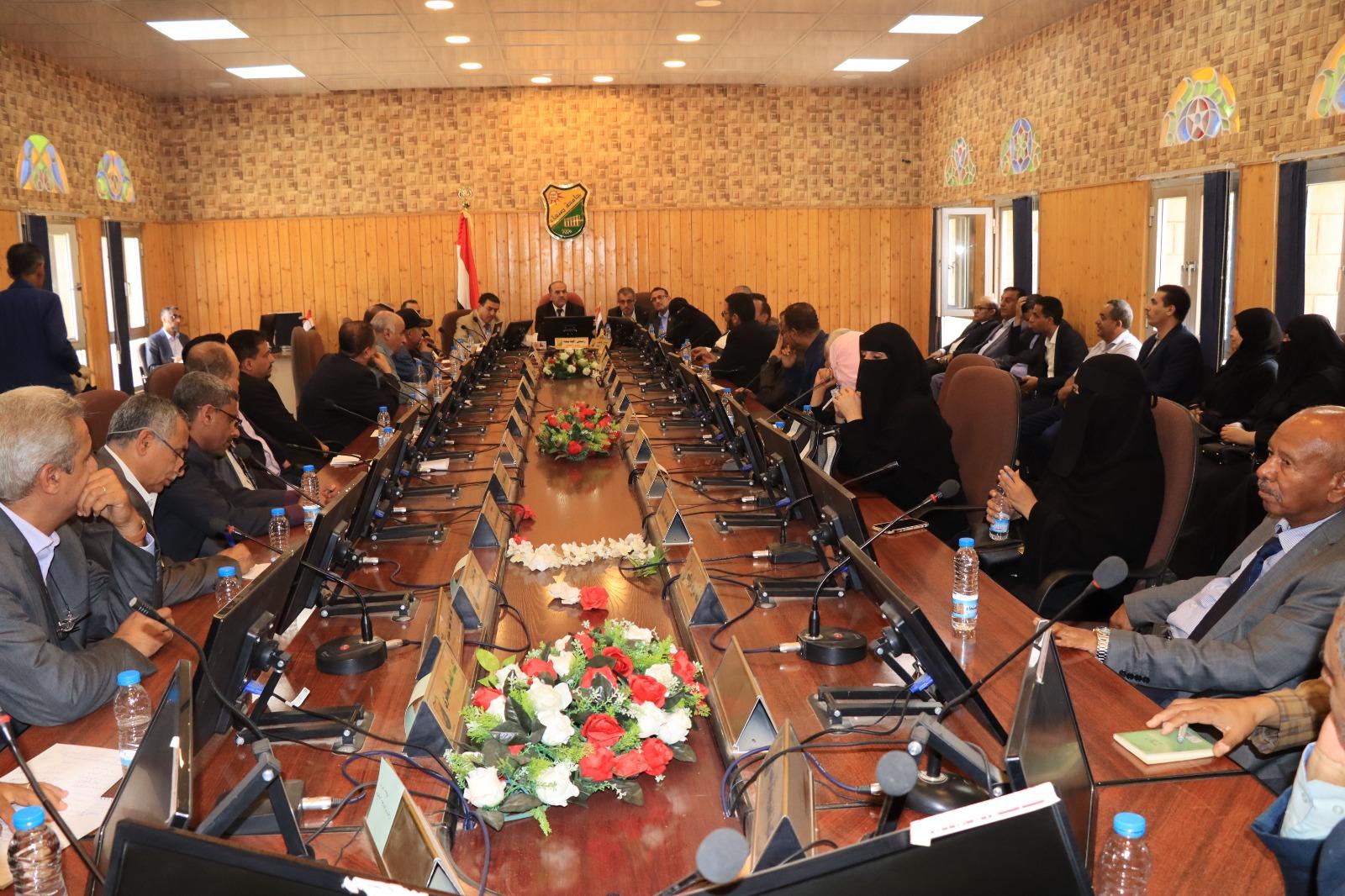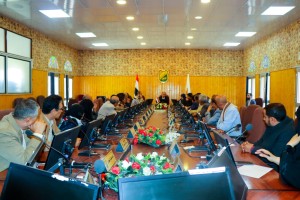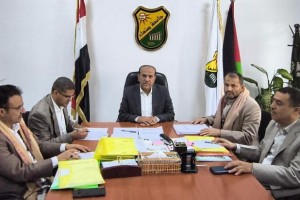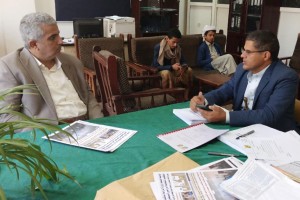Sana’a University Rector Meets with Directors of Scientific and Research Centers and Their Deputies

Sana’a: Sunday, April 20, 2025
The Sana’a University Rector, Prof. Mohammed Ahmed Al-Bukhaiti, met today with the directors of the scientific and research centers, their deputies, and quality assurance officers at the university. The meeting aimed to address their concerns and discuss strategies to enhance the performance of these centers.
The meeting was attended by the Vice-Rector for Academic Affairs, Prof. Ibrahim Al-Mutaa; Vice-Rector for Student Affairs, Prof. Mohammed Shukri; Assistant Vice-Rector for Postgraduate Studies, Prof. Huda Al-Imad; the Rector’s Assistant for Scientific and Research Centers’ Affairs, Prof. Zaid Al-Wareeth; the Rector’s Assistant for Media Affairs, Mr. Adel Al-Habbabi; and the University’s General Secretary, Mr. Iskandar Al-Maqaleh.
Prof. Al-Bukhaiti commended the developmental efforts made in the centers over the past six years, noting that these efforts have significantly changed the perception of these centers. They are now highly regarded for their expertise, programs, and services offered to the community. He emphasized that these efforts deserve recognition.
Moreover, the Rector announced that a ceremony will be held to honor and bid farewell to the former university rector, Prof Al-Kasem Abbas, for his fruitful contributions during his tenure.
Prof. Al-Bukhaiti stressed the importance of collaboration, integration, and working with a spirit of teamwork, underpinned by mutual respect, devotion, and love, to achieve the required excellence.
He pointed out that research work is a crucial aspect, particularly in graduate studies within the faculties or research centers, requiring genuine effort and quality performance through valuable lectures, well-prepared materials, and cooperative work between the faculties and centers to accumulate knowledge and achieve the desired quality. This collaboration is essential to produce well-qualified graduates who can compete both nationally and internationally.
The Rector also highlighted the need for providing high-quality educational services, emphasizing excellent teaching and research performance, as well as the importance of well-equipped classrooms with modern tools. Performance evaluations for the centers and the services they provide will be carried out rigorously and objectively.
He elaborated on the new vision, which focuses on positioning the university as a center of expertise, offering its services to both public and private sector institutions through a structured approach that benefits the community. This will aim to generate new resources for the university and create job opportunities. A guide will be prepared for the services the university can offer through its faculties and research centers to various state institutions and the wider community.
Furthermore, Prof. Al-Bukhaiti mentioned that after meeting essential financial obligations, the university will prioritize health insurance, academic and administrative rights, particularly the payment of faculty salaries for extra hours, and will focus on enhancing the facilities in the faculties, including laboratories, workshops, maintenance, and educational supplies, as well as improving the administrative structure.
For his part, Prof. Zaid Al-Wareeth, for Scientific and Research Centers, discussed the significant role played by the 25 scientific and research centers in postgraduate programs and their continuous efforts to stay updated, forging key partnerships with both state institutions and the broader community.
During the meeting, the directors and their deputies expressed their concerns and aspirations, focusing on the importance of coordination and collaboration between the faculties and centers to provide high-quality services to state institutions and society. They also emphasized the need to retain academic staff from various international universities, as valuable experience, and to address their status to continue fulfilling their scientific and research missions.
The directors further highlighted the importance of aligning the titles and objectives of graduate theses with the goals and specializations of the centers to achieve the desired outcomes. They also called for the development of practical mechanisms to communicate the role of these centers to the state and society, ensuring mutual benefits and supporting development programs. In addition, they suggested reviewing similar centers’ specializations and functions, considering their merger to avoid redundancy.
The attendees also stressed the importance of pursuing institutional and program accreditation for scientific centers, similar to what the faculties have achieved, given that the centers offer graduate programs in various fields. They also recommended addressing the employment status of center staff with the Ministry of Civil Service, according to the university’s regulations and the higher education law.
The directors of the centers raised the need for a clear mechanism for PG students’ tuition fees to prevent disparities between centers. The Rector has tasked a committee, chaired by the Vice-Rector for Academic Affairs, to develop a vision for addressing and resolving these issues as soon as possible.
Discover more from Sana'a University
Subscribe to get the latest posts sent to your email.






